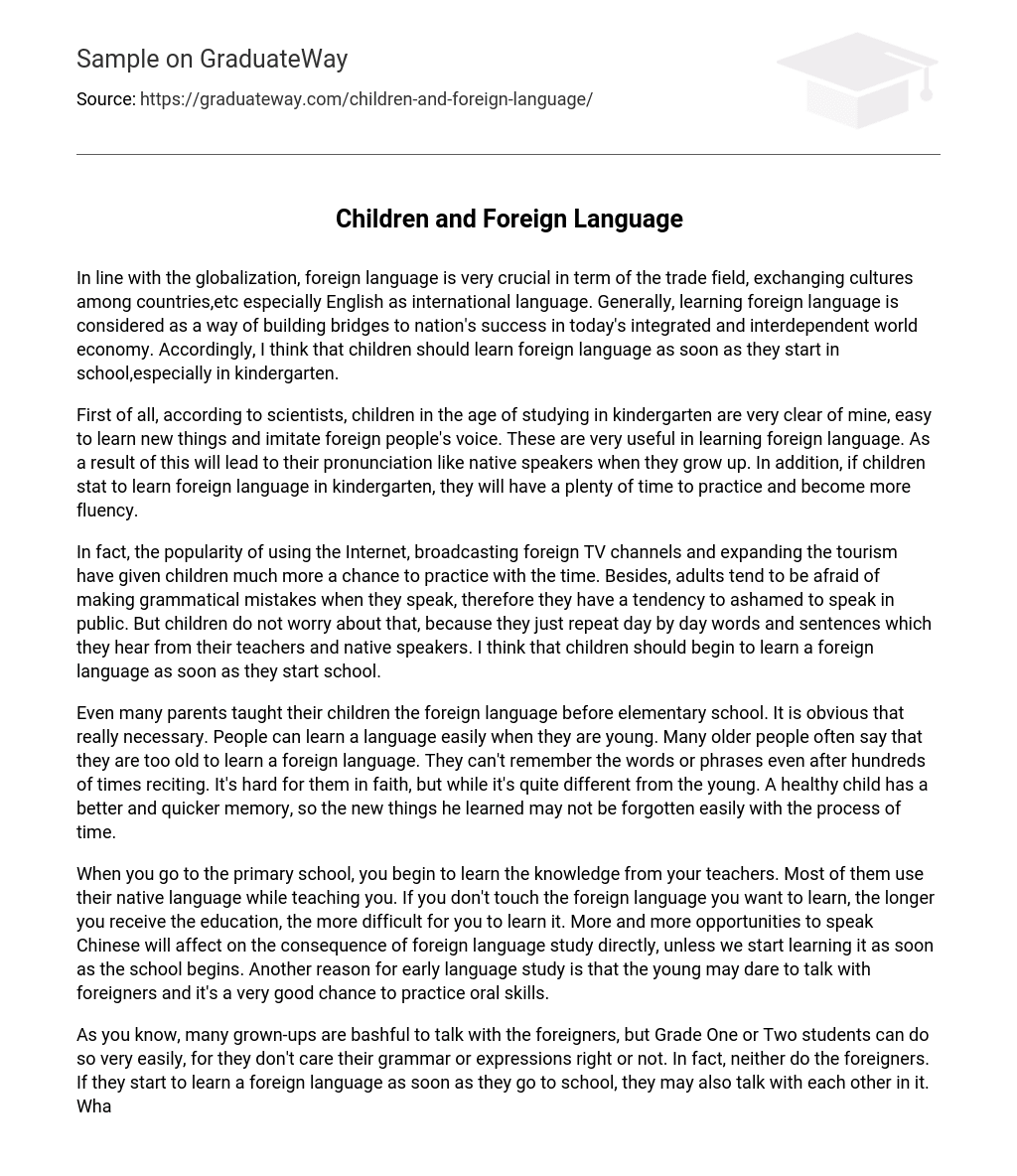In line with the globalization, foreign language is very crucial in term of the trade field, exchanging cultures among countries,etc especially English as international language. Generally, learning foreign language is considered as a way of building bridges to nation’s success in today’s integrated and interdependent world economy. Accordingly, I think that children should learn foreign language as soon as they start in school,especially in kindergarten.
First of all, according to scientists, children in the age of studying in kindergarten are very clear of mine, easy to learn new things and imitate foreign people’s voice. These are very useful in learning foreign language. As a result of this will lead to their pronunciation like native speakers when they grow up. In addition, if children stat to learn foreign language in kindergarten, they will have a plenty of time to practice and become more fluency.
In fact, the popularity of using the Internet, broadcasting foreign TV channels and expanding the tourism have given children much more a chance to practice with the time. Besides, adults tend to be afraid of making grammatical mistakes when they speak, therefore they have a tendency to ashamed to speak in public. But children do not worry about that, because they just repeat day by day words and sentences which they hear from their teachers and native speakers. I think that children should begin to learn a foreign language as soon as they start school.
Even many parents taught their children the foreign language before elementary school. It is obvious that really necessary. People can learn a language easily when they are young. Many older people often say that they are too old to learn a foreign language. They can’t remember the words or phrases even after hundreds of times reciting. It’s hard for them in faith, but while it’s quite different from the young. A healthy child has a better and quicker memory, so the new things he learned may not be forgotten easily with the process of time.
When you go to the primary school, you begin to learn the knowledge from your teachers. Most of them use their native language while teaching you. If you don’t touch the foreign language you want to learn, the longer you receive the education, the more difficult for you to learn it. More and more opportunities to speak Chinese will affect on the consequence of foreign language study directly, unless we start learning it as soon as the school begins. Another reason for early language study is that the young may dare to talk with foreigners and it’s a very good chance to practice oral skills.
As you know, many grown-ups are bashful to talk with the foreigners, but Grade One or Two students can do so very easily, for they don’t care their grammar or expressions right or not. In fact, neither do the foreigners. If they start to learn a foreign language as soon as they go to school, they may also talk with each other in it. What a good chance! It will help a lot, I think. In a word, learning a foreign language as soon as starting school is helpful and important. It’s not a burden but one of the best ways of learning.
Nowadays, some may hold the opinion that children should begin learning a foreign language as soon as they start school, but others have a negative attitude that learning a foreign language early will pose too much pressure on kids and will affect their mother-tongue learning. As far as I am concerned, I agree that bilingual education should start as early as possible. My arguments for this point are listed as follows. I agree with the statement without reservation since children learn second languages quickly than adults.
As we have observed, children can learn languages faster than adults; and immigrant children translate for their parents who have not learned the language; and that child learners speak without a foreign accent, whereas this is impossible for adult learners. Therefore the earlier kids learn a second language, the less difficulties they would meet when they grow up and have to face a foreign language speaking environment. Another reason why I agree with the above statement is that I believe that bilingual education can be fun and stimulate children’s learning interest.
Many parents and teachers know how to teach kids a second language in an interesting way. One of my students told me that, when he was in kindergarten, every day his mum taught him a few Chinese characters as well as their meaning in English. As time passed, the kid became keen to learn English. Sometimes he gave mum and dad a quiz by speaking some English words and asking them what their meaning is. Bilingual education will not affect the mother-tongue study of children. As we are living in an environment of pure Chinese conversation and traditional culture, it is impossible for us to give up our culture and language.
Teachers also are trying to arrange the curriculum in a proper way. For instance, they create an English-speaking environment for children in the morning, and a Chinese-speaking environment in the afternoon. Bilingual education has become a trend. No matter we like it or not, future educational undertakings will become more international, and exchanges between schools throughout the world will increase. Given this, speaking a common language is important and, to this purpose, bilingual teaching is an inevitable way.





